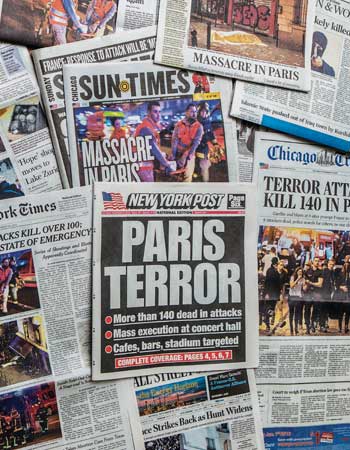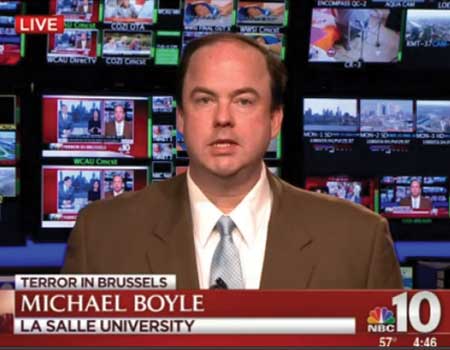HOMETOWN: Philadelphia
TITLE: Associate Professor of Political Science
YEARS AT LA SALLE: Four as a student, six as a professor
DEGREES: B.A., La Salle University
M.Phil., University of Cambridge
M.P.P., Kennedy School of Government, Harvard University
Ph.D., University of Cambridge
 1. Tell me about the work and research you do.
1. Tell me about the work and research you do.
I predominantly work in the areas of terrorism and political violence, the use of new technology, and also U.S. foreign policy.
2. What sparked this interest?
I was a political science student here at La Salle, and went into international politics because I found it exciting. I got started in my specific area of research as a Kennedy School of Government (Harvard University) master’s student, and as an intern in the State Department in 2001 in the Balkans bureau. My job was to read intelligence reports about political violence in the Balkans in the post-conflict period. It struck me that people were struggling to predict post-conflict violence. Was it criminal? Was it political? Was it an attempt to overturn a peace settlement? That became the focus of my doctoral dissertation at Cambridge.
3. What was your role with the Obama campaign?
I worked with the Obama campaign in 2007–08 as an adviser on counter terrorism and on drones. Later, when I saw the Obama administration expand the use of drone strikes, I became concerned they were doing it in excess, and decided to write a series of critiques that raised questions about whether drone strikes were as strategically effective as people implied they were. My conclusion is that drone advocates have an attenuated definition of effectiveness. A narrow definition might be if the strikes eliminated a bad guy. But you have to ask the question whether it disposes the population against you and whether there are longer-term strategic consequences of other states beginning to use drones in the same way. If others are emulating U.S. actions, are you producing a more violent world?
4. You’re off campus for a semester working on a new book. What’s it about?
The new book is under contract with Oxford University Press and is called “The Drone Age: How Drone Technology Will Change War and Peace.” The book focuses more on how the technology of drones shifts incentive structures, and less on the technology and aviation of drones. If you have a drone, what are the other governments and non-state actors like the Islamic State more likely to do? What are they less likely to do? I am predominantly concerned that drone technology does not lead to more violence.
 5. What is the biggest mistake in our thinking about terrorism?
5. What is the biggest mistake in our thinking about terrorism?
We believe stereotypes that these are angry young religious believers in caves—they are not. Early on, Al Qaeda had application forms and a benefit plan to sustain involvement. If you go back to the 1990s and 2000s you find documentation about their personnel problems and bureaucratic infrastructure. ISIS also has a bureaucratic infrastructure. To sustain involvement of these young men, they need to be paid, they need access to regular benefits like health care. If they’re married, they need to ensure that their wives are cared for, and that there is effectively a life insurance policy. The Islamic State has learned this very effectively. They are even more organized than Al Qaeda.
6. When you think back to your time at La Salle as a student what stands out?
At La Salle, you’re not a number, you’re a person. People take an interest in you and your intellectual development; they push you to read, push you to think about things, and allow you to find your own feet. I came to La Salle as a nervous 18-year-old and I was pushed to explore intellectual avenues I probably wouldn’t have. I’m not sure that would have happened had I been in a place with 300 people in a classroom or where you wouldn’t see the same faculty members over and over again. La Salle played an enormous role in shaping me and putting me on my way, and I owe the University a huge debt of gratitude.
